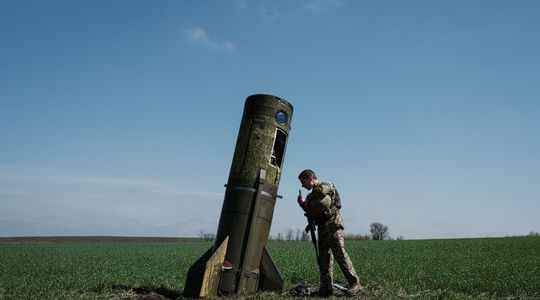The message got through. Russia’s foreign minister has accused Ukraine of ‘pretending’ to negotiate for peace and warned Westerners about their repeated arms deliveries to the country led by Volodymyr Zelensky, which would bring the world closer to a conflict global. In any case, this is what Sergei Lavrov clearly implied when he answered a question from Russian television on Monday, which wondered whether the Russian-Ukrainian conflict could degenerate into World War III: “The danger is serious, it is real, it cannot be underestimated.”
For Olivier Schmitt, director of studies and professor at the Institut des Hautes Etudes de Défense Nationale (IHEDN), this threat is not new since from the start of the war, Moscow had brandished the nuclear threat to oppose the Western sanctions against the Russian economy. It aims above all to intimidate the Western camp by putting pressure on public opinion. The goal? Slow down or even suspend Ukrainian arms supplies and take a concrete lead in its strategic battle in the Donbass.
L’Express: Why is Moscow brandishing the threat of a “Third World War”?
Oliver Schmitt: It is above all a way of intimidating the West. As Russia does not reach its military objectives in Ukraine, it seeks to prevent the deliveries of weapons which strongly change the balance of power on the front. French, American and British arms deliveries increased last week, which is not to the liking of the Kremlin. Especially in a situation where it does not gain strategic positions in the Donbass in the face of Ukrainian resistance rearmed by the West.
This feeds the frustration of Russian troops who do not renew their military arsenal as quickly as their adversary. In a war where Ukraine’s strategic objective is to wear down and exhaust Russian troops, Western military support is a trap for Russia. To agitate the prospect of a third world war is strategic. This is a lever used by Moscow to show their dissatisfaction with Western assistance to Ukraine. He is not the only one. The Russians had, for example, sent a diplomatic note to the Americans protesting against military assistance.
What is the purpose of this threat?
The objective is to put pressure on Western leaders by raising the threat of an escalation in public opinion. This is to attract portions of the population sensitive to Moscow’s rhetoric. Westerners are therefore careful not to be recognized as co-belligerents in the conflict, which would push Russia to consider itself attacked under international law. The will to take the crest line between support for Ukraine and non-interference in the fighting is therefore permanent in the European and American camp.
What is the impact of this enterprise of intimidation launched by Moscow on Westerners?
The strategy does not necessarily have an immediate goal. It is above all a question of putting pressure on Western opinions, as I was saying, to nourish pressure on the shoulders of the leaders. This rhetoric currently affects fairly minority segments. We note, for example, in Germany, a country traditionally reluctant to militarization, a public opinion largely won over to support for Ukraine.
Can this strategy aimed at public opinion turn against Russia by mobilizing an anti-war discourse among its population?
It’s hard to say because the Russians control the inner narrative very strongly. Russian television channels have presented NATO as an enemy for ten years. There is an ideological and mental preparation which consists in saying that NATO is at war against Russia. A significant part of the population has already integrated this notion that Westerners are angry with them. Lavrov’s rhetoric is not likely to frighten since many already consider themselves at war with the Western camp.
Is the nuclear threat to be taken literally?
The escalation would mainly involve the use of nuclear weapons, which would be a fundamental break in deterrence as it has been practiced for 70 years. In Russian doctrine, recourse to nuclear weapons is considered only when there is a vital threat to the interests of the State. Even in the face of a military defeat as humiliating as it is in Ukraine, it would be difficult for the authorities to employ the argument of life threat.
Hence the importance for Westerners not to appear as co-belligerents. Escalation seems unlikely, especially since the principle of nuclear deterrence is response. In the event of a nuclear attack, there would be a French or British response which would wipe Moscow off the map. I don’t see Vladimir Putin taking such a bias for a simple military defeat in the Donbass.
Is the Russian desire to globalize the conflict structuring?
The escalation is mostly rhetorical. If Moscow decides to globalize the conflict by attacking Moldova, for example, the Russian capital is exposed to significant losses in the ranks of its army. Rather than an invasion on its soil, the West is plagued by cyber attacks. One can imagine nuisance actions erasing websites or even sabotage actions against production equipment and factories. It is to be expected that there will be increased conflict in cyberspace.
